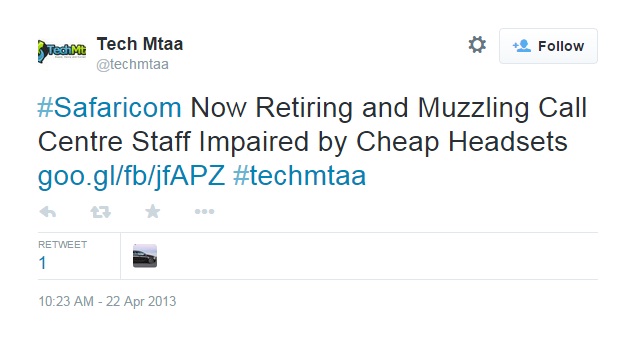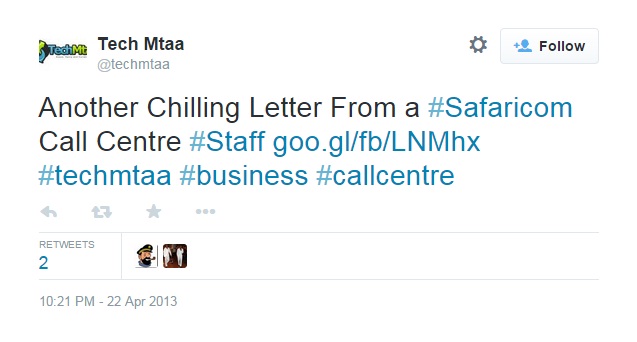Review: High Court Ruling in Safaricom v. Robert Alai Case
- Victor Nzomo |
- December 3, 2014 |
- CIPIT Insights,
- Social Media and the Law


Earlier this year, the High Court made a ruling in the case of Safaricom Limited v Robert Alai [2014] eKLR in which the telecommunications giant had sought orders from the court to compel controversial Robert Alai to remove two articles published on his weblog www.techmtaa.com titled: “Safaricom Now Retiring and Muzzling Call Center Staff Impaired by Cheap Headsets” and “Another Chilling Letter from Safaricom Call Center Staff”.
A copy of the ruling is available here.
Most Kenyans on social media have no doubt heard about Alai. Media reports indicate that Alai has several pending court cases arising from tweets, posts and other material he has published online including cases filed by former Head of Public Service Francis Kimemia and former Government Spokesman Alfred Mutua.
In the present case, Safaricom claims that Alai sensationally published and widely disseminated two articles on the internet making false and libelous statements against Safaricom in relation to alleged malpractice, mistreatment of staff, bribery of unnamed individuals and unsubstantiated claims of intimidation. In addition, Safaricom alleges that after publishing the damaging articles, Alai continues to solicit inflammatory comments from bloggers and the general public on his libelous articles hosted on www.techmtaa.com. Safaricom appealed to the court to grant a temporary injunction against Alai claiming that its corporate reputation faced a real and present risk and danger of injury from Alai’s online publications.
In reply to Safaricom’s allegations, Alai totally denied making use of social media and blogs to disparage Safaricom by posting false comments either in the past or present and denied having abused the social media and blogs or other platforms to disseminate vitriol and half truths about Safaricom. Alai further stated before the court that the alleged articles and subject matter appearing on the social media and other internet platforms are aspects of freedom of media as guaranteed by the Constitution as they are true and accurate reporting on judicial proceedings and amount to fair information and comment on public interest. Therefore Alai urged the court not to allow Safaricom’s application for a temporary injunction as it would be a great injustice to him as he will be required to take responsibility and stop or delete publications, posting which he has no control over.
In making its ruling, the court appears to have considered Safaricom’s submission that Alai enjoyed worldwide acclaim for his blog and social media updates on the ‘Westgate Siege’ and only seemed to distance himself from the said blog in the present case because it was convenient for him. In this connection, the court agrees that Safaricom is a telecommunication company with a large clientele and as such it stands to suffer irreparable injury or loss arising from Alai’s publications characterised as “permanent and within reach by millions of people”. In light of the above, the court ruled that Safaricom had established a prima facie case against Alai with a probability of success. The court also make the important finding that should the said allegations by Alai prove false Safaricom’s reputation would be greatly affected and it would stand to suffer irreparable loss that might not be adequately compensated by an award in damages and the balance of convenience tilts in favor of Safaricom.
With regard to the above ruling, there are three problematic orders in Safaricom’s application that ought to have been carefully interrogated by the court namely:
“ii. That pending the hearing and determination of this application inter partes, or until further orders of the court an order of temporary injunction do issue restraining the defendant the defendant whether by himself or associates from further publishing any articles on the internet or any other medium libelous of the plaintiff.
v. That pending the hearing and determination of the substantive suit order of a temporary injunction do issue restraining the defendant whether by himself or associates from publishing any articles on the internet or any other medium libelous of the plaintiff.
vii. That pending the hearing and determination of this application inter partes, or until further orders of the court an order of temporary injunction do issue restraining the defendant whether himself or associates from further publishing any articles on the internet or any other medium libelous of the plaintiff”
The above prayers have a chilling effect on the freedoms of expression and media under the Constitution because of the use of the word “any”. The onus ought to be on Safaricom to prove that the articles are libelous as opposed to using the court system to muzzle Alai.
As this case proceeds to full hearing and determination, this blogger will keenly be following the developments.
